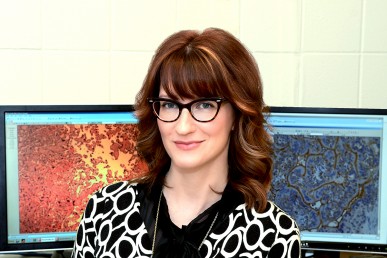Research field sites rife with sexual harassment

Julienne Rutherford, assistant professor in the UIC College of Nursing, is co-author of a study that found sexual harassment is prevalent in many fields of academic research. Photo: Mark Mershon/UIC College of Nursing (select image to download larger size).
More than research is occurring at academic field sites.
A survey of male and female researchers from a variety of scientific disciplines found that many experienced or witnessed unwanted sexual advances in the field.
The study, published in the journal PLOS ONE, found 64 percent of respondents, which included 142 men and 516 women in anthropology, archaeology, geology and other scientific specialties, reported they had experienced sexual harassment such as inappropriate sexual remarks, comments about physical beauty, or jokes about cognitive sex differences. More than 20 percent said they had been victims of sexual assault, including unwanted physical contact of a sexual nature, physical threats or rape.
Undergraduate students, graduate students and postdoctoral researchers reported more unwanted sexual attention than did faculty researchers.
Respondents were recruited through social media and websites serving scientific disciplines known for field research. An online survey asked about their educational and professional status, gender, age, and experiences during field studies.
More than 90 percent of the women and 70 percent of the men who experienced sexual harassment said it occurred when they were trainees or employees. Five of the trainees who reported being harassed were in high school at the time of the incident, researchers said.
“Our main findings – that women trainees were disproportionately targeted for abuse and felt they had few avenues to report or resolve these problems – suggest that at least some field sites were not safe, nor inclusive,” said Kate Clancy, professor of anthropology at the University of Illinois at Urbana-Champaign, and first author of the study.
“We worry this is at least one mechanism driving women from science.”
Female researchers reported most often that they were the targets of researchers who were superior to them in rank. Males reported being harassed or abused mostly by their peers.
“Previous work by other researchers has shown that being targeted by one’s superior in the workplace has a more severe impact on psychological well-being and job performance than when the perpetrator is a peer,” said coauthor Julienne Rutherford, assistant professor of women, children and health science at the University of Illinois at Chicago.
This suggests that women may be even more burdened by sexual aggression in the workplace, she said.
For many social-, life-, and earth-science disciplines, conducting research in field settings is an integral part of scholarship. Locations are often at a distance from a researcher’s campus and may be far from their home country.
“Fieldwork is often what stirs the first interest in science in a young person, and research has shown that scientists who do more fieldwork write more papers and get more grants,” said Clancy. “We have to pay attention to how people are treated there.”
Scientists who lead field studies are trained to raise and manage funds, follow research protocols, and provide logistical support to their teams. But they are rarely trained to manage interpersonal conflicts that might arise in remote locations, said coauthor Katie Hinde, assistant professor of human evolutionary biology at Harvard University.
“The discussion that emerges from these results provides an opportunity for our professional communities to come together and affect solutions to improve the experiences of our trainees and colleagues,” Hinde said.
Robin Nelson, assistant professor of anthropology at Skidmore College and another coauthor of the study, said many participants reported a lack of knowledge regarding institutional policies or an appropriate reporting channel when misconduct occurs.
“These findings suggest that, in effect, many researchers were ill-equipped to advocate for themselves or others in cases of harassment or assault.”
Rutherford said the study may “open a new window” as to why women outnumber men in fields such as anthropology and biology during the training stage, yet continue to be underrepresented in the professoriate.
“Many people in the sciences will be surprised that these kinds of abuses are still so common, thinking it was all in the past,” she said. “Sadly, that’s not the case. And despite outnumbering men in many doctoral programs, women are still getting the message that they are not welcome as full members in academic society.”
